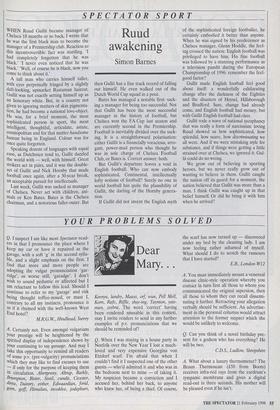SPECTATOR SPORT
Ruud awakening
Simon Barnes
WHEN Ruud Gullit became manager of Chelsea 18 months or so back, I wrote that he was the first black man to become the manager of a Premiership club. Reaction to this incontrovertible fact was startling. 'I had completely forgotten that he was black.' I never even noticed that he was black."Well, of course he is black, now you come to think about it.'
A tall man who carries himself taller, with eyes perpetually fringed by a slightly daft-looking, upmarket Rastaman haircut, Gullit was not exactly setting himself up as an honorary white. But, in a country not given to ignoring matters of skin pigmenta- tion, he had become a national love-object. He was, for a brief moment, the most sophisticated person in sport, the most intelligent, thoughtful, articulate, astute, cosmopolitan and for that matter handsome human being in England. Colour was for once quite forgotten. Speaking dozens of languages with equal ease, as Dutchmen tend to, Gullit dazzled the world with — well, with himself. Great strikers act in pairs, and it was the double- act of Gullit and Nick Homby that made football once again, after a 30-year break, an acceptable pursuit for intellectuals. Last week, Gullit was sacked as manager of Chelsea. Never act with children, ani- mals or Ken Bates, Bates is the Chelsea chairman, and a notorious faller-outer. But then Gullit has a fine track record of falling out himself. He even walked out of the Dutch World Cup squad in a pout.
Bates has managed a notable first: sack- ing a manager for being too successful. Not that Gullit has been the most successful manager in the history of football, but Chelsea won the FA Cup last season and are currently second in the Premiership. Football is inevitably divided over the sack- ing. It is a straightforward polarisation: either Gullit is a financially voracious, arro- gant, power-mad person who thought he was in sole charge of Chelsea Football Club, or Bates is. Correct answer: both.
But Gullit's departure leaves a void in English football. Who can now embody sophisticated, Continental, intellectually lofty notions of football? Surely no one in world football has quite the plausibility of Gullit, the darling of the Hornby genera- tion.
If Gullit did not invent the English myth of the sophisticated foreign footballer, he certainly embodied it better than anyone. When he was signed by his predecessor as Chelsea manager, Glenn Hoddle, the feel- ing crossed the nation: English football was privileged to have him. His fine football was followed by a stunning performance as a television pundit during the European Championship of 1996: remember the feel- good factor?
Gullit made English football feel good about itself: a wonderfully exhilarating change after the darkness of the Eighties and the disasters of Heysel, Hillsborough and Bradford. Sure, change had already come, and English football had money, but with Gullit English football had class.
Gullit rode a wave of national sycophancy that was really a form of narcissism: loving Ruud showed us how sophisticated, how splendid, how suave, how discriminating we all were. And if we were mistaking style for substance, and if things were getting a little strained over at Chelsea, we ignored it. Gul- lit could do no wrong.
We grow out of believing in sporting heroes, but we never really grow out of wanting to believe in them. Gullit caught the nation off its guard: for a moment, the nation believed that Gullit was more than a man. I think Gullit was caught up in that belief himself. Or did he bring it with him when he arrived?


























































 Previous page
Previous page